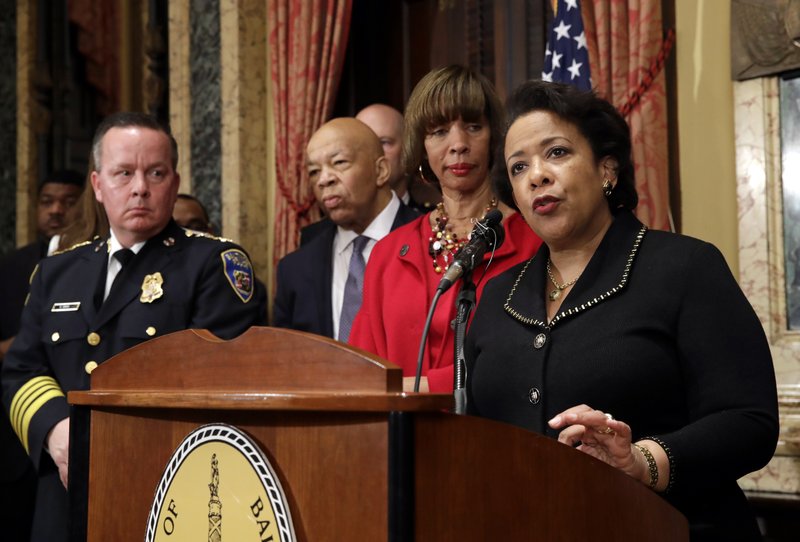BALTIMORE -- More than a year and a half after the Justice Department began investigating policing practices in Baltimore, the city's Police Department on Thursday agreed to a set of court-enforceable overhauls designed to curb discriminatory practices that have plagued the agency.
Mayor Catherine Pugh called Thursday a "great day" in Baltimore as she announced the 227-page consent decree agreement at City Hall alongside U.S. Attorney General Loretta Lynch, Baltimore Police Commissioner Kevin Davis and other officials.
"For me, this was not about cost. This was about fairness and understanding," Pugh said. She said the focus of the overhauls would be "training, training, training, training."
The Justice Department agreement mandates changes in the most fundamental aspects of daily police work, including traffic stops, suspect searches and arrests. The consent decree marks the culmination of months of negotiations with the federal government and is intended to correct constitutional violations identified in a scathing report released last year.
The filing, in the waning days of Lynch's tenure, serves as a capstone moment for an administration that has made civil-rights enforcement a priority and that has pursued similar agreements with other large American police forces.
The agreement is intended to remain in place long after Lynch leaves office, although civil liberties advocates are concerned that U.S. Sen. Jeff Sessions, an Alabama Republican who has been nominated to replace Lynch, may not enforce consent decrees with the same vigor.
"It is binding," Lynch said in moving to address those concerns, "and it will live on past this administration."
A hearing will allow for public comment on the agreement before it's approved by a federal judge.
The Justice Department began investigating the Baltimore police force after the April 2015 death of Freddie Gray, a young black man who was fatally injured while in the custody of officers. Its report last August found that officers were routinely stopping large numbers of people in poor, black neighborhoods for dubious reasons, and unlawfully arresting residents for speaking out in ways police deemed disrespectful.
Gray's death shed light on the department's deficiencies, including its officers' unfair treatment of blacks living in the city's most vulnerable neighborhoods. But it also illuminated systemic failures that touched on all aspects of local government: The lack of jobs, educational opportunities and decent, safe housing have long contributed to conditions of inequality in the city.
The consent decree discourages the arrests of people for offenses such as loitering or littering, requiring a supervisor to sign off on any request to take someone into custody for a minor infraction, and also mandates basic training for making stops and searches.
In addition, it commands officers to use de-escalation techniques, thoroughly investigate sexual assault claims and send specially trained units to distress calls involving people with mental illness.
Police will not be able to stop someone just because the person is in a high-crime area or just because the person is trying to avoid contact with an officer, according to the document.
The agreement also lays out policies for transporting prisoners, which harks back to the death of Gray, who suffered a spinal cord injury in the back of a police van. The consent decree requires officers to ensure that prisoners are protected with seat belts and to check on them periodically.
The cost of the changes will be shaped by future decisions, including by a federal monitor appointed to oversee the process. The agreement says the monitor will be selected for three years, and then can be reappointed. The deal also includes a cap on how much the monitor can be paid by the city, at $1.475 million annually. Other costs associated with the deal were not outlined. The changes are expected to cost the city millions.
Hassan Murphy, one of the attorneys representing Gray's mother and stepfather, said they are "gratified to know at least something major would come from their child's death."
The Justice Department in the Obama administration has headed about two dozen wide-ranging investigations of police agencies, including in Chicago, Cleveland and Ferguson, Mo., and is enforcing consent decrees with many of them. The department is expected to announce today its findings in the Chicago investigation.
At his confirmation hearing this week, Sessions expressed ambivalence about the enforcement of consent decrees. He said that while he believes that individual officers need to be held accountable for wrongdoing, he was concerned about maligning an entire police agency for what may be the bad actions of a small number of officers.
Information for this article was contributed by Juliet Linderman, Eric Tucker and David Dishneau of The Associated Press; and by Kevin Rector, Luke Broadwater, Justin Fenton, Justin George and Erin Cox of The Baltimore Sun.
A Section on 01/13/2017
